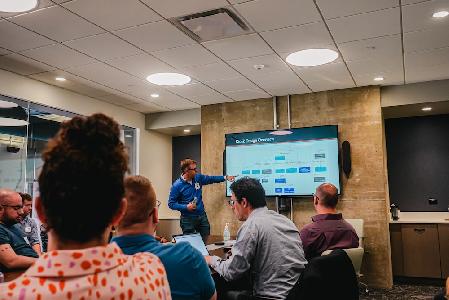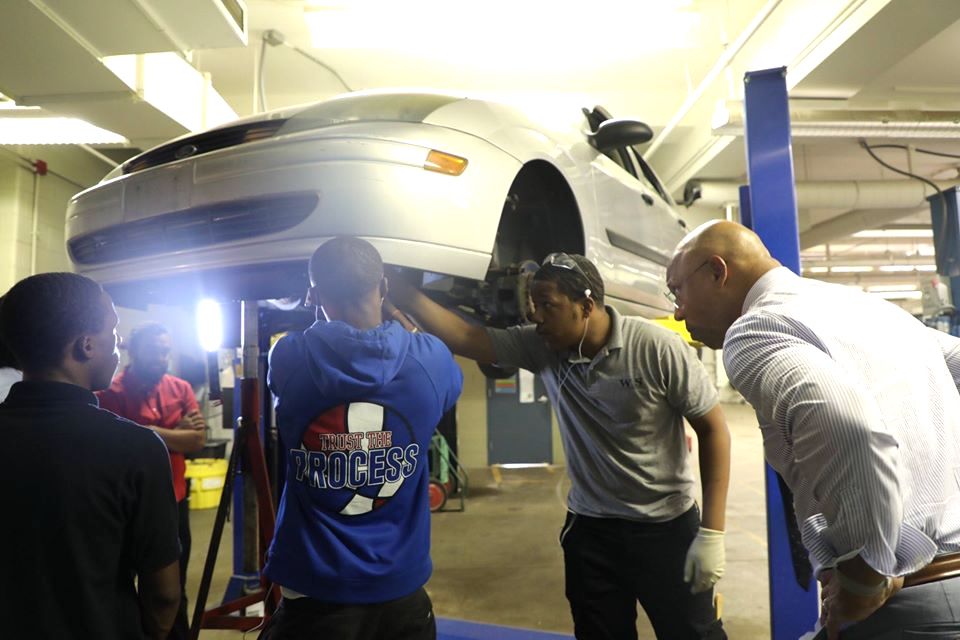It’s official: The School District of Philadelphia will educate students via virtual learning through at least November. As difficult as the transition may be for regular schools — and students — to go virtual during the pandemic, project-based schools have their own challenges in adapting to the moment.
Matthew Riggan is cofounder and executive director of The Workshop School, a seven-year-old, project-based high school in University City that operates within the Philly school district. Here, the roughly 250 students normally engage in collaborative, skills-based projects based on in-person interaction. You might know the school for making things like cars and laser-cut “jawn” ornaments and launching Little Baby’s Ice Cream into space from Delco. The idea is that the work always has some real-world correlation and is therefore more engaging and useful to students than in the typical learning model.
Riggan has no doubts that teaching this fall will feel a lot different. How it goes will be contingent on how the environment educators work in continues to shift and how they can combine virtual and tactile learning to create that experience.
All students already had their own Chromebooks by which they share, complete and submit work, “so that part of the transition was pretty simple,” Riggan said. “Even in a virtual environment, the actual teaching happens live and is facilitated by teachers. We don’t do much automated instruction.”
One unique challenge is adapting the auto tech program: As no one will be allowed to enter the building, there’s also no shop access. That usually hands-on learning will have to happen online, too.
The ED told Technical.ly that a new method of teaching computer-aided drafting (CAD) software is an example of how The Workshop School is adapting to the virtual moment.
“We’re looking at teaching CAD virtually and having [students] create projects at home,” he said. “The project will be to design and build something that will have multiple parts to be fitted together.”
One of the biggest lessons Riggan and other educators he’s talked to have learned from the pandemic is the value of relationships in the learning process.
“High school tends to be about content and content expertise. [But] what really matters when all that’s taken away is keeping kids connected to us and each other,” he said. “That’s part of well-being and mental health. That sense of community is one of the things that keeps students attached to begin with.”
Riggan said the skills The Workshop School emphasizes in its curriculum such as problem solving and collecting and synthesizing information have been vital in its staff members’ and students’ personal experiences of adapting to the pandemic.
Virtual learning does have a few unique advantages. Class size does not mean the same thing in an online environment as it would mean in a physical one, which gives teachers the ability to better differentiate how they teach individual students, for instance. Still, the physical presence of a teacher is irreplaceable in fostering live collaboration and community; Riggan estimated that teachers lose 60 to 80% of their sensory input when teaching virtually. Not being able to “read the room” is also a disadvantage he said teachers face during virtual experiences.
Finding solutions to pandemic-prompted education problems has affirmed Riggan’s belief in The Workshop School’s model. The school leadership’s willingness to collaborate with staff members has been essential in navigating the pandemic.
“If you don’t have a lot of trust in the expertise of the teachers in doing the work, you can’t have a lot of success,” he said. “We’re having success because we’ve had this team of teachers working hard on this since the spring.”
In addition to collaboration, Riggan said being able to iterate quickly has served The Workshop School well in responding to the pandemic. With conditions frequently changing, he believes in being able to quickly adapt — as a school is more important than “having a master plan.”
Michael Butler is a 2020-2022 corps member for Report for America, an initiative of The Groundtruth Project that pairs young journalists with local newsrooms. This position is supported by the Lenfest Institute for Journalism.Join the conversation!
Find news, events, jobs and people who share your interests on Technical.ly's open community Slack

Philly daily roundup: Student-made college cost app; Central High is robotics world champ; Internet subsidy expiration looms

Philly daily roundup: Earth Day glossary; Gen AI's energy cost; Biotech incubator in Horsham

Philly daily roundup: Women's health startup wins pitch; $204M for internet access; 'GamingWalls' for sports venues


